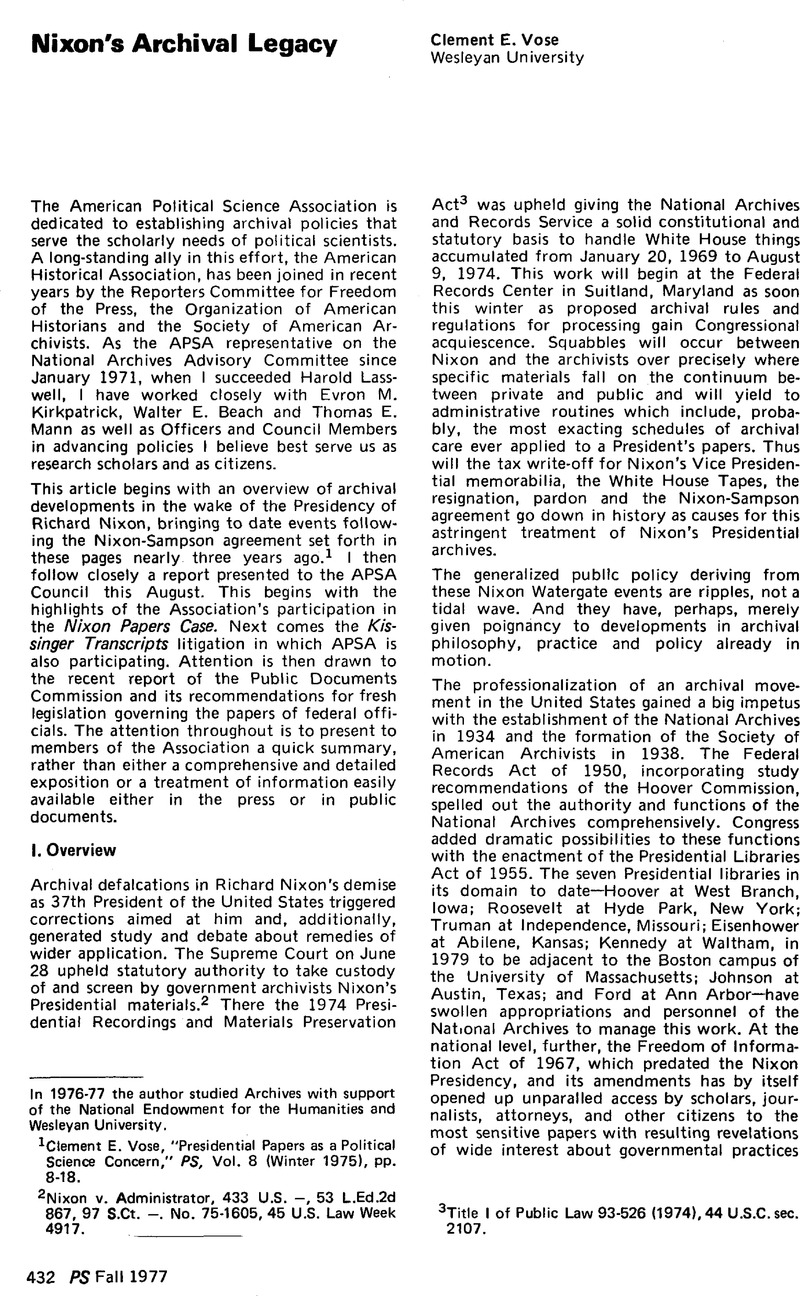No CrossRef data available.
Published online by Cambridge University Press: 28 November 2022

In 1976–77 the author studied Archives with support of the National Endowment for the Humanities and Wesleyan University.
1 Vose, Clement E., “Presidential Papers as a Political Science Concern,” PS, Vol. 8 (Winter 1975), pp. 8–18.CrossRefGoogle Scholar
2 Nixon v. Administrator, 433 U.S. –, 53 L.Ed.2d 867, 97 S.Ct. –. No. 75–1605, 45 U.S. Law Week 4917.
3 Title I of Public Law 93–526 (1974), 44 U.S.C, sec. 2107.
4 Publication of these two statutes, alone of all public laws, regularly in the United States Government Manual is one measure of their significance. See Appendix C of the 1977/78 Government Manual, pp. 812–830. An invaluable guide is Litigation Under the Amended Federal Freedom of Information Act. Edited by Marwick, Christine M.. (Washington, D.C.: Freedom of Information Clearinghouse of the Center for the Study of Responsive Law, 2d ed., 1977).Google Scholar
5 H.R. 10612, Arndt. No. 1901, 94th Cong., 2d Sess., 122 Cong. Rec. S. 12244 (1976). The amendment proposed by Senators Javits and Ribicoff, providing that a “charitable contribution of a literary, musical, or artistic compositon by a taxpayer” might, under carefully controlled arrangements count as a tax exemption. The amendment's force would not apply to anything written while the taxpayer held government office or was related to such duties. 122 Cong. Rec. S. 122244–51, 59–65. provides the most thorough recent airing of the issues at stake.
6 This is from the summary of the case in United States Law Week. 45 L.W. 3523 (1977).
7 For the full text of Ford's gift agreement and the press conference, see “Donation of the President's Papers to the Government,” Weekly Compilation of Presidential Documents, Vol. 12 (Dec. 20, 1976), pp. 1709–1719.
8 Sorenson refuted in detail charges he mishandled classified information and improperly took a tax donation for papers given to the Kennedy Library. Hearings before Senate Select Committee on Intelligence (Statement of Theodore C. Sorenson), 95th Cong., 1st Sess. (Jan. 19, 1977), pp. 16–38.
9 Similar excitement took place in Great Britain when the Sunday Times began serializing the diaries of former Cabinet Minister Richard Crossman in the autumn of 1975. The Attorney General argued that confidentiality was essential to the workings of the cabinet system and that such confidentiality was protected by common law. The ban on publication was lifted by Lord Chief Justice Widgery, Oct. 1, 1975. See Young, Hugo, The Crossman Affair (London: Hamish Hamilton and Jonathan Cape, 1976).Google Scholar
10 45 L.W. 4917.
11 Nixon v. Sampson, 389 F.Supp. 107 (1975).
12 Nixon v. Administrator, 408 F.Supp. 321 (1976).
13 Hearings Before the Subcommittee on Printing of the Committee on House Administration (GSA Regulations to Implement Title I of the Presidential Recordings and Materials Act). 94th Cong., 1st Sess., pp. 97–128. For a discussion of this rule-making procedure, though not this instance of it, see Stewart, Geoffrey S., “Constitutionality of the Legislative Veto,” Harvard Journal of Legislation, Vol. 13 (April 1976), pp. 593–619.Google Scholar Stewart finds this legislative review mechanism does not violate the Constitutional allocation of powers between the legislative and executive powers.
14 “Preservation and Protection of and Access to the Presidential Historical Materials of the Nixon Administration: Special Access Regulations.” GSA Rules. 42 Fed. Reg. 40858 (Aug. 12, 1977).
15 Vol. 15, No. 5 (May/June, 1977).
16 March 1977, p. 3.
17 The Final Report has not been widely available and is to be printed late in 1977 by the Government Printing Office. Fora ventilation of complaints and explanations about rules of access, see Historians, Archives and Access to the Papers of Recent Public Figures: The New Harmony Conference. Alonzo L. Hamby and Edward Weldon, editors. Published by Organization of American Historians for the AHA-OAH-SAA Committee on Historians and Archives. (Bloomington: Indiana University Publications, 1977).